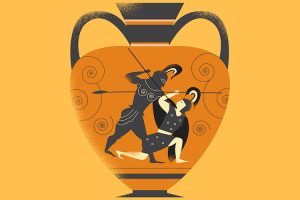Critique
Philosopher Stephen Eric Bronner on the ancient Greek understanding of the concept of "critique", the Marxist ...
Philosophers can think of economic productivity as if it were a pie. One very large pie represents the economy, so then, when philosophers think of their own jobs, “What is our job as people developing a theory of justice?”, justice is the question of how to divide the pie. That is an interesting thing, now that you think of how to divide the pie, what would be a fair way to divide it, the only fair way to divide it would be to equal shares. Or if you say, well, people are equal or anyway they have equal rights, then, if justice is about anything, it is about people having equal shares.
Some people nowadays in the aftermath of 1989 and the falling of one officially egalitarian regime after another will say things today like, “That equal shares theory is good in theory, but it does not work in practice”. And that is not what I say. I say that if it works that badly in practice, there is something wrong with it in theory too. So here is what I would say.
Imagine a busy intersection, where it is regulated by traffic lights – it is red lights and green lights – and if you take a snapshot of that intersection, it is a lot like a snapshot we take of the economic pie. You look at the snapshot, and what do you say? You say, “That’s unfair”.
Those people have a green light, those people have a red light, and that is not equal treatment, so everybody should have a green light, and everybody should have a green light at the same time, everybody should have a green light right now, and then you say, “OK, that’s fine in theory, but it does not work in practice”.
It is important to understand that society is in motion, it is important to understand that society is a constellation, a network of revolving opportunities. It is important that almost everyone, or as many people as possible have good opportunities in the same way that it is important that the light turns green at some point for everybody.
Everybody gets to move at some point. But it is not important at all that everyone has a green light at the same time. That is not what matters. It is even counter-productive. And so that kind of equality, snapshot equality, is a spurious equality. It is not the equality that matters, morally speaking. The morality that matters morally speaking is the kind of morality and the kind of equality that you can see coming into place over time.
18 year olds and 40 year olds don’t have the same income – it’s not important that they don’t have the same income. It’s probably better that they don’t have the same income in the same way it’s better that not everyone gets a green light at the same time. It’s important that 18-yeat olds have a chance to move up, and get promoted, and learn new skills, and become experienced valuable workers, but it takes years to do that. And it’s just fine that it takes years to do that.
The fundamental role for government is the simple role of managing traffic.
If you turn the role of choosing people’s destinations for them over to government, you get traffic jams, you get bureaucracy, you get a form of traffic management that doesn’t even manage traffic, that doesn’t work anymore.
Serious equality is about everyone having an opportunity to make something of their own lives, not necessarily the same thing of their own lives, but everyone has a chance to be what they can be without being bogged down by crime, or by bureaucracy, for example, not being bogged down by other people choosing their destinations for them. So if you really thought that people are too stupid to choose their own destinations, it’s a mystery for me why people would jump from that to the conclusion that they should be picking other people’s destinations instead of their own. I don’t see that, I don’t think that follows at all.
Serious equality is about everyone having an opportunity to choose a destination of their own without interference from the people around them as much as possible, putting people in a position where they can afford to stay out of each other’s way and just enabling them to pursue destinations of their own, and to cooperate when it’s mutually beneficial. You stop people from driving drunk, for example, but you don’t pick people’s destinations for them. Let people choose their own, let them help each other when they can, let them “Uber”. It’s funny, you don’t have to make it illegal not to “Uber”, just leave people alone and they will realize that their car has excess capacity and that that capacity can be usefully rented to other people. You can make other people better off by giving them rides, and it’s easy for you to do, and you can make some money doing that. Let people ‘Uber’ – that is the 21st century paradigm of how people develop spontaneous institutions by being of assistance to each other when you simply leave them alone.

Philosopher Stephen Eric Bronner on the ancient Greek understanding of the concept of "critique", the Marxist ...

Neuroscientist Jeff Lichtman on built-in skills of animals, speed of learning, and importance of obtaining inf...

Neuroscientist Mahzarin Banaji on objective music perception, failing at assessing people, and arranged marria...